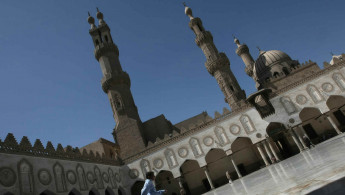Al-Azhar head replaced after apostasy accusation saga
The head of Egypt's Al-Azhar university has been replaced after calling a controversial Muslim reformer and TV personality an apostate.
Ahmed Hosni Taha, the acting university president of al-Azhar, one of the world's leading Islamic seats of learning, apologised on Thursday after labelling Islam al-Behairy an "apostate" for criticising some of the founding scholars of Islamic law during a television interview.
"My response...was incorrect and it contradicts the way of Al-Azhar," Taha said in an apology posted on the university's website.
But the apology was not sufficient to save Taha's job.
On Friday al-Azhar issued a statement saying that Grand Iman Ahmed al-Tayeb, a former president of the university, would be resuming the position.
Behairy, the former host of TV show Al-Kahera Wel Nas, had previously clashed with figures from al-Azhar angered by his attacks on canonical religious books, and some of Sunni Islam’s important scholars.
Notably, in April 2015 Al-Azhar said that views advocated by Behairy did not constitute "reforms" but "insults to Islamic heritage".
Controversial comments made by the TV host at the time followed calls made by President Abdel Fattah al-Sisi for "a religious revolution" arguing that extremist groups such as the Islamic State group were damaging Islam's reputation, and becoming a "source of worry, fear, danger, murder and destruction to all the world".
Behairy was consequently taken off air, and later sentenced to one year in prison after al-Azhar levelled a number of law suits against him, before being pardoned by a presidential decree.
Egypt's constitution outlaws insults against the three monotheist religions recognised by the state — Islam, Christianity and Judaism.
Al-Azhar, critics allege, has not done enough to counter Islamist extremism. A rift between the institution and members of the Egyptian political establishment has also developed since Sisi took power.





 Follow the Middle East's top stories in English at The New Arab on Google News
Follow the Middle East's top stories in English at The New Arab on Google News
![The UAE is widely suspected of arming the RSF militia [Getty]](/sites/default/files/styles/image_330x185/public/2024-11/GettyImages-472529908.jpg?h=69f2b9d0&itok=Yauw3YTG)
![Netanyahu furiously denounced the ICC [Getty]](/sites/default/files/styles/image_330x185/public/2024-11/GettyImages-2169352575.jpg?h=199d8c1f&itok=-vRiruf5)
![Both Hamas and the Palestinian Authority welcomed the ICC arrest warrants [Getty]](/sites/default/files/styles/image_330x185/public/2024-11/GettyImages-2178351173.jpg?h=199d8c1f&itok=TV858iVg)